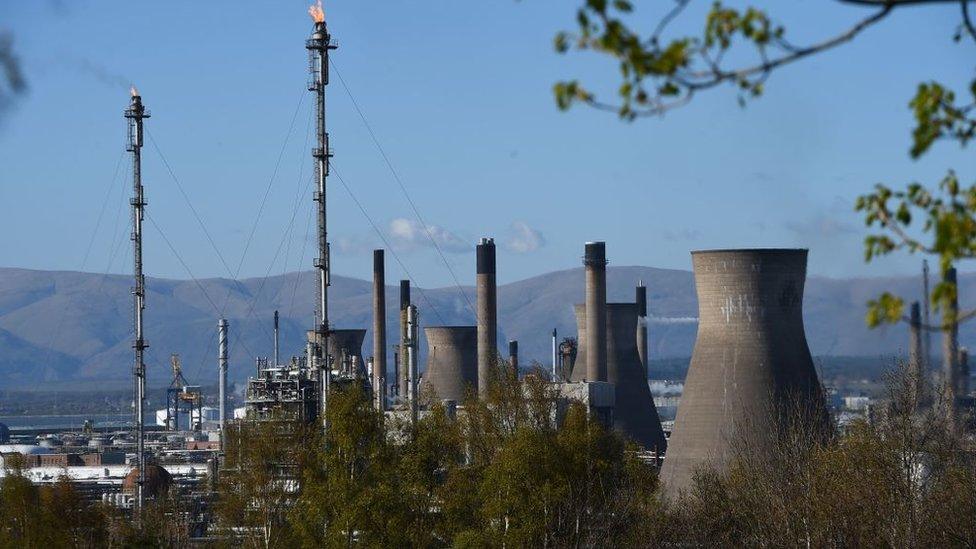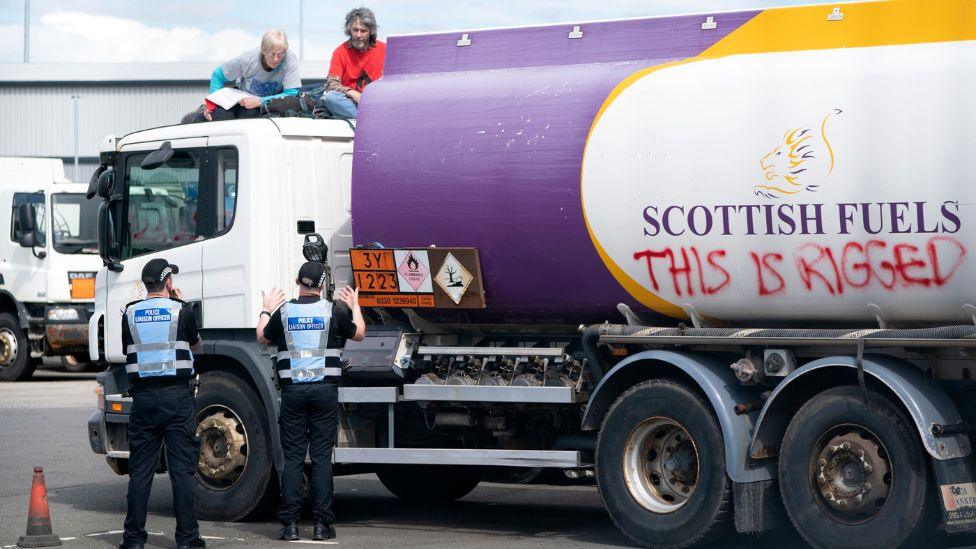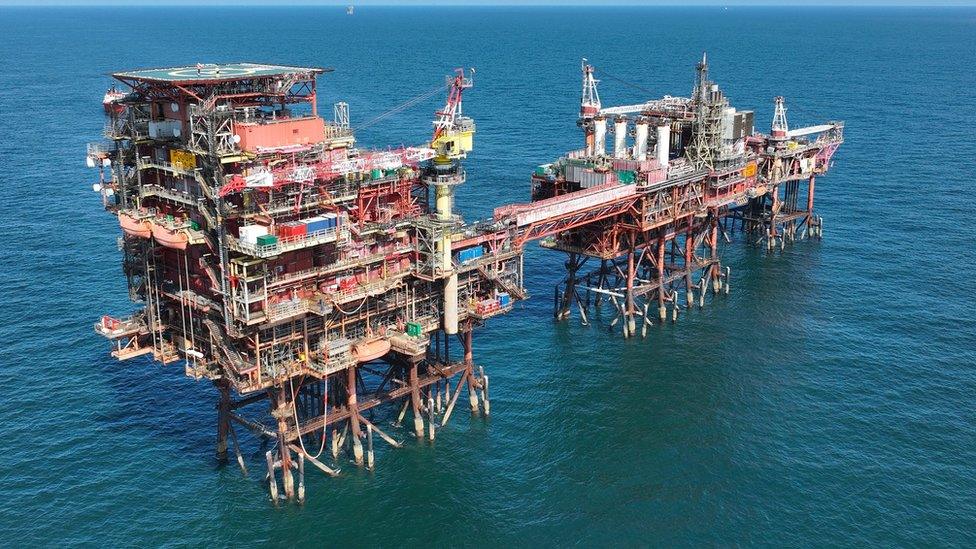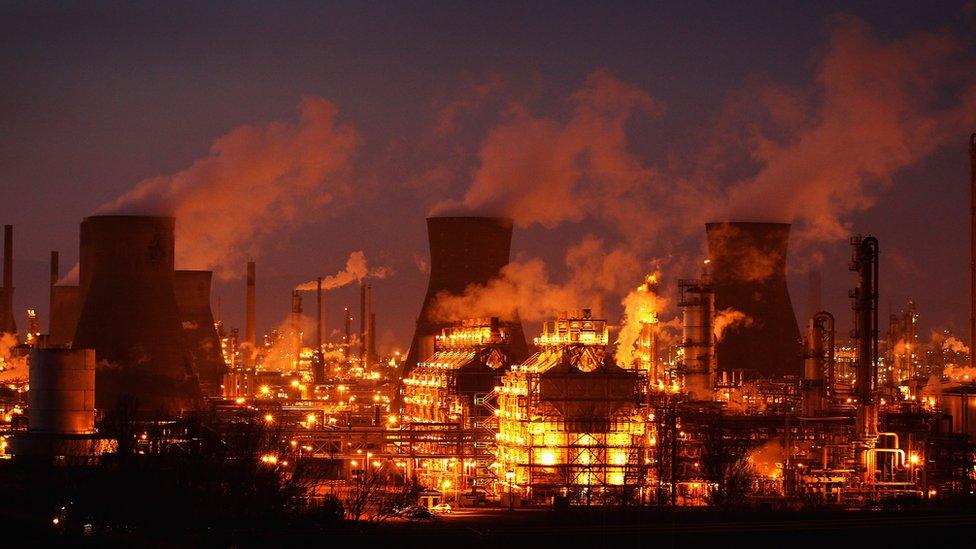Grangemouth oil refinery could cease operations by 2025
- Published
- comments

Scotland's only oil refinery could cease operations as soon as 2025 under plans announced by owners Petroineos.
The company said Grangemouth had been facing significant challenges because of global market pressures.
Petroineos intends to turn the site into a fuels import terminal which would result in the loss of at least 400 jobs.
Work to transform the site is expected to take 18 months.
The refining business at Grangemouth is owned by Petroineos which is a joint venture between Chinese state-owned PetroChina and London-based Ineos.
About 2,000 people are directly employed at Grangemouth including 500 at the refinery, 450 on the Forties pipeline from the North Sea and a further 1,000 in the Ineos petrochemicals business.
Some 100 staff would be needed for the planned import terminal.
Petroineos said the timescale for the transition had "not yet been determined", but the work was expected to take about 18 months, so refinery operations were expected to continue until Spring 2025.
The firm said its new terminal would be able to import petrol, diesel, aviation fuel and kerosene into Scotland.
Petroineos said it was working closely on the project with a "range of interested parties", including the Scottish and UK governments, and said it would provide more information in due course.

Climate protesters took action at Grangemouth in July
Franck Demay, chief executive officer at Petroineos Refining, said it was "business-as-usual" for the time being.
He said: "As the energy transition gathers pace, this is a necessary step in adapting our business to reflect the decline in demand for the type of fuels we produce.
"As a prudent operator, we must plan accordingly, but the precise timeline for implementing any change has yet to be determined.
"This is the start of a journey to transform our operation from one that manufactures fuel products, into a business that imports finished fuel products for onward distribution to customers."
First Minister Humza Yousaf said the scale of the job losses could be "quite significant" and the Scottish government was ready to work with the business and trade unions.
"This will be a very worrying time for the workers that are impacted by this," he said.
Asked if his government bore some responsibility for the situation, he said oil and gas licensing decisions are made by the UK government.
But he stressed the importance of a "just transition" and "taking the workers with us on the journey towards a sustainable future".
Mr Yousaf added: "We're at very early stages. We've just heard the announcement of what could potentially happen in the future.
"The job of government now is to work closely with the owners, with trade unions, to ensure a sustainable future for our country."
'Highly-skilled jobs'
Oil operations at Grangemouth can be traced back to 1919. The refinery, established in 1924, was one of the first crude oil refineries in the UK.
Grangemouth was run by Innovene until 2005. Ineos - owned by one of Britain's richest men Jim Ratcliffe - bought Innovene in a £5bn takeover.
In 2019 plans were announced to build a £350m energy plant at the site, as part of a £1bn investments in the UK oil and chemical industries.
Trade union Unite has said it would "leave no stone unturned" in its fight to save jobs at Grangemouth.
Sharon Graham, the union's general secretary, said: "This proposal clearly raises concerns for the livelihoods of our members but also poses major questions over energy supply and security going forward."
Derek Thomson, the union's Scottish secretary, added: "Every option must be on the table in order to secure the hundreds of highly skilled jobs based at the Grangemouth complex for the long-term."
The refinery is a primary supplier of aviation fuel for Scotland's airports, and a major supplier of petrol and diesel in central Scotland.
The 1,700-acre site supplies 70% of the fuel to Scotland's filling stations as well as Northern Ireland and the north of England.
It also provides power to the Forties oil pipeline, which brings oil and gas ashore from the North Sea.
According to Petroineos, the refinery is responsible for 4% of Scotland's GDP, external and approximately 8% of its manufacturing base.
However, economists at the Fraser of Allander Institute dispute this, suggesting a lower GDP figure of around 0.25% to 0.3%, external.
In July, climate protestors blocked the entrance to the refinery and climbed on equipment within the site. Police had to use a crane to remove them. 20 people were arrested during the incident.
Last August, Grangemouth staff were among thousands at energy sites across the UK who voted in favour of strike action over pay. And in October 2022 an unofficial walkout was also held by contractors.
The Grangemouth complex has dominated the night skyline of central Scotland for decades.
With the ability to handle 150,000 barrels of oil per day, the facility on the Firth of Forth is one of only six refineries remaining in the UK.
It imports crude oil via the Finnart terminal which opened at Loch Long on the Firth of Clyde in 1951 and also handles North Sea crude transported via the Forties pipeline.
Petroineos itself says Grangemouth is of "strategic importance" to Scotland's energy supply and economic development.
Related topics
- Published12 March 2024

- Published20 July 2023

- Published10 August 2022

- Published22 November 2023

- Published27 February 2019
